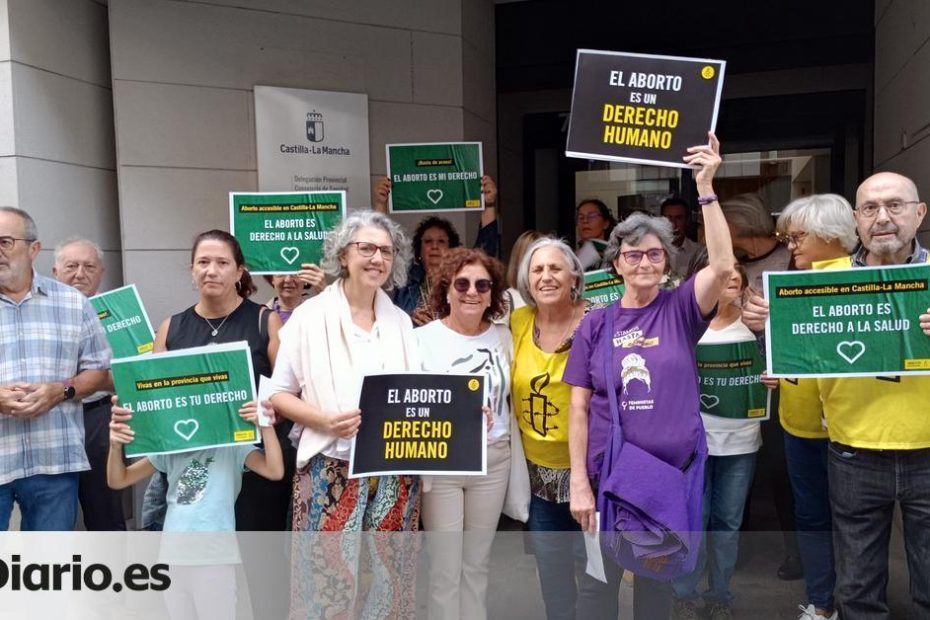Claudia is a woman from Toledo who tells the story of her abortion like this: “A long and painful process.” She is one of the people who has had to leave her province to be able to carry out a voluntary termination of pregnancy. A pregnancy that began “full of hope and expectations,” but that ended, for health reasons, in an abortion.
“To my surprise, all the doctors who treated me clarified that they did not follow any procedure and that they could not help me in the process,” he explained a few months ago in conversation with elDiarioclm.es. “I can’t describe the pain and sadness I felt then, but I knew that the best thing for the baby and for me was to undergo an abortion,” she told this medium.
A year has passed and the situation has not changed. Women like Claudia, who live in provinces where abortions are not performed in public healthcare, are forced to move to other provinces in order to receive this care. The Organic Law on sexual and reproductive health and voluntary interruption of pregnancy establishes that “users of the National Health System will have access to voluntary interruption of pregnancy under conditions of effective equality,” but this provision, in practice, is not implemented. complies.
Just look at what happens in Castilla-La Mancha. In this autonomous community, voluntary terminations of pregnancy are only carried out in two clinics, both private, with which the Health Service of Castilla-La Mancha (SESCAM) maintains a collaboration agreement. They are located in Albacete and Ciudad Real.
Amnesty International has called for rallies in each of the provincial capitals of Castilla-La Mancha this Thursday, October 3, under the slogan ‘Abortion is the right to health’. The reason? “There are a series of issues that remain to be implemented in the region, and that is why we have addressed the Ministries of Health and Equality. We have not obtained answers, beyond the link of the consultation period of the registry of objectors,” explains Rafaela Alonso, head of Political Advocacy at Amnesty International in Castilla-La Mancha.

“It was one of the demands: that the registry of conscientious objectors that is included in the law be launched,” the NGO acknowledges. In fact, as confirmed by the regional Health Service to elDiarioclm.es, Until now, there was no such registry of conscientious objectors and the same sources add that historically there was a “generalized objection” to practicing voluntary terminations of pregnancy among health personnel.
Now, with the law in hand, Amnesty International has focused on a situation that they consider anomalous for which they demand solutions. The humanitarian organization believes that “without prejudice to the individual right of each health professional to declare themselves an objector,” the law states that access or quality of care “shall not be affected” by the individual exercise of the right to conscientious objection.
In April of this year, some 25 organizations joined an Amnesty International initiative, in which they expressed their “concern” to the Government of Castilla-La Mancha about the exercise of the right to voluntary termination of pregnancy. “We also asked for information about the clinical committee that decides on abortion cases from week 22 of gestation,” says Rafaela Alonso. No results so far.
Pressure for women at the doors of clinics “against the law”
Amnesty International also recalls that in the Albacete clinic to which many women go to be treated there are “situations that are contrary to the law” due to the presence of “groups of people who pray at the door, who try to talk with women and with medical personnel”, to avoid abortions. “Nothing has been done to prevent these situations from occurring,” they lament.
From Ágora Feminista, an organization from Albacete, they add that the mobilization proposed this week throughout the region is directly related to the commemoration of the Global Day of Action for Access to Legal and Safe Abortion, which took place on September 28. “We ask for protection and privacy for women who decide to abort freely. We already have the legal mechanisms, what we need is to apply them,” explains Lola Gómez, from the Albacete association.
The association has reported for “years” about the situation that occurs in front of the Iris Clinic in Albacete, both to the Albacete City Council, the Community Board, the National Police or the Government Subdelegation “without, so far, measures have been taken to guarantee the privacy of women and their exercise of the right to voluntary interruption of pregnancy free of coercion.” In 2023, in fact, this association reported the situation to the Prosecutor’s Office.
Finally, they insist that abortions be performed in public healthcare. “Only in this way do you guarantee provision throughout the regional territory. “We need to ensure that women do not have to travel to other provinces,” she says. To this, he adds that “the system should guarantee that there are people trained to perform abortions.” “If there isn’t one, they look for it. It is an issue of programming and planning of services, of political will,” the activist says.
